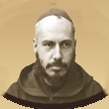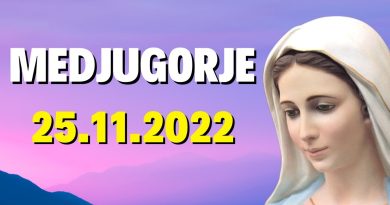It was in May 1928, when a doctor diagnosed Fra Giacomo with Parkinson’s disease. As time went on this condition went from bad to worse.
However Fra Giacomo managed to attend some classes whereas Father Paolino of Premariacco gave him private lessons, summarizing and explaining the other courses. Doubt start creeping in his Capuchin superiors’ minds: would be appropriate to ordain Fra Giacomo? Nevertheless, after taking seriously Father Paolino’s advice, Fra Giacomo was dispensed from one year of study. As his illness was not yet too advanced, he received minor orders, the sub-diaconate, as well as the diaconate. On July 21, 1929, he finally received the priesthood ordination from the hands of the venerable Pietro La Fontaine, the Patriarch of Venice. On August 4 he sang his first Mass in his home parish of Balduina. Father Carlo Trentin proudly welcomed him and gave a vibrant address for the occasion. Father Giacomo, now a priest forever, radiated peaceful joy. To mark his ordination anniversary, every year he would offer thanksgiving for the beautiful day of his ordination, which he always regarded as a gift from Heaven. Padre Giacomo continued to study theology in Venice for another year, to the extent of his abilities.
He was then sent to Slovenia for fifteen months, and following that to Udine in Friuli. The Capuchin convent there was a haven that welcomed those who wanted to be reconciled with God and discretely start a new life. Padre Giacomo dedicated his life to the ministry of confession. A cell was put up for him with a grille in the wall, hence permitting him to hear penitents without having to move. For some sixteen years, he received dozens of people there every day. At all hours, in front of an image of Christ crowned with thorns, he generously welcomed all those who come, as if to a dispensary of God’s forgiveness.
The power to forgive sins, which Christ gave to his Apostles on the very evening of his Resurrection (cf. Jn 20:23) as the first fruit of his Passion and death, applies to the greatest evil that can affect us. As the Catechism of the Catholic Church reminds us, “To the eyes of faith no evil is graver than sin and nothing has worse consequences for sinners themselves, for the Church, and for the whole world (CCC, No. 1448). Nevertheless, St. John Paul II in his General Audience on April 15, 1992, said, the specific ministry of priests does not exclude, but rather includes the ‘common priesthood’ of the faithful. ‘He who created us without our help will not save us without our consent,’ said St. Augustine. The active role of the Christian in the Sacrament of Penance consists in acknowleding one’s own faults through confession which, save in exceptional cases, is made individually before the priest; in expressing repentance for the offense to God, that is, contrition; in humbly submitting to the institutional priesthood of the Church to receive the ‘efficient sign’ of divine forgiveness, absolution; to offer the satisfaction imposed by the priest as a sign of personal participation in the reparatory sacrifice of Christ who gave himself to the Father as a Host for our faults; and thanksgiving for the forgiveness obtained” (no. 7).
Question to be asked:
Do I believe in God’s promises till the very end?
Fr Mario Attard OFM Cap





